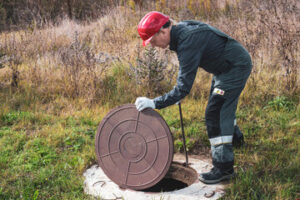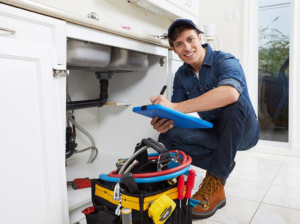The sump pump protects your home from flooding, limits moisture levels and reduces mold growth. Licensed plumbers perform professional maintenance that helps keep your pump working properly.

While some sump pump maintenance can be performed by in-the-know homeowners, other issues require a professional. Unplug the pump and inspect it for rust or corrosion. Pour five gallons of water into the pit and check that the float switch turns on and off correctly. Visit https://www.plumbing-express.com/ to learn more.
Plumbers are responsible for the water supply, waste removal and heating and cooling systems in residential, commercial, and industrial buildings. This career requires an in-depth knowledge of blueprints and construction to install piping, fixtures and appliances, such as toilets, sinks, bathtubs, showers, dishwashers and water heaters. Plumbers also repair existing plumbing and sewage systems. They may work on small or large projects, depending on their employer and the nature of the job. Plumbers often work with dangerous chemicals, toxins and high-pressure pipes, so it is important for them to adhere to strict safety protocols.
A plumber will start a job by checking the visible water supply lines for leaks, corrosion, breaks and clogs. They will also compare the water pressure of a home to local codes and note any abnormally high or low levels. The plumber will inspect all drain pipes, p-traps and overflow drains for clogs, leaks and detachments. Fixtures like sinks, faucets and toilets will be checked for proper operation and to ensure they are installed according to code. Leaking or damaged pipes will need to be fixed or replaced.
When working on new construction sites, plumbers will install piping and fixtures according to the building plans and specifications. They may lay out piping for entire buildings or work on specific sections, such as kitchens, bathrooms, or laundry rooms. Plumbers may also work on plumbing for septic systems and water heating equipment.
Many people assume that plumbers only work on toilets, but this is far from the truth. While clogged toilets and water leaky showers are certainly among the most common jobs for plumbers, they also spend a lot of time working on sewer systems, installing hot tubs and dishwashers, and performing other tasks like repairing or replacing drywall.
The plumbing industry is known as a “recession-proof” trade, which means that it is always in need of skilled workers. This is because plumbing issues are usually urgent and cannot wait, unlike other maintenance or repair jobs. The need for plumbers even increases during times of economic crisis, when homeowners are more likely to neglect non-essential maintenance and turn to hiring a professional for emergency services.
Inspect the Discharge Pipe
Plumbing inspections are a critical part of the process for ensuring that building code compliance and health and safety standards are met. When plumbers conduct an inspection, they’ll check the shut-off valve to ensure it closes and seals properly to prevent a flood. They’ll also inspect the piping for leaks and make sure it is sized appropriately. They’ll test gas pipe connections to make sure they are tight and that carbon monoxide gas isn’t leaking out.
While homeowners can perform inspections themselves, hiring a professional service is preferable. Professionals have access to specialized tools and equipment that can help them locate and repair issues with drainage pipes quickly, safely, and effectively. They can also walk around the property and look at the grading to see how water drains away from the house, test French drains to see if they are clogged with sediment, and check the sump pit to make sure it is clean and functioning correctly. This is a much more comprehensive inspection than you’d get from self-inspection. Additionally, TPR valve discharge piping should always be piped independently from other equipment drains and water heater pans to prevent unobserved termination capping. When the TPR valve activates, it will send a powerful jet of hot water through the discharge pipe that can damage anything in its path.
Inspect the Pump
Plumbing professionals use their skills to inspect, install, repair and maintain piping systems that disperse water, drain waste, and deliver heating and cooling. They work with blueprints and building codes to plan and execute plumbing installation projects. They also identify existing and potential issues, such as leaks or clogs.
Plumbers inspect residential and commercial plumbing systems of all sizes. Their inspection methods include visual examination, running water and checking pressure, as well as high-tech techniques like camera pipe inspections to locate problems behind walls or under floors. They also offer advice about upgrades and can help homeowners find energy-efficient fixtures, piping materials and smart home leak detection sensors.
If the plumber is examining a home’s plumbing, they may test water pressure at an exterior hose bib. Proper water pressure is between 40 and 80 psi, and higher pressure can put undue stress on pipes and fixtures. The plumber might also check gas lines for safety by using a sniffer device, and the sewer line to ensure it is functioning correctly.
In addition to testing the pump at rated capacity, the plumber will operate all discharge and intake valves, relief valves, manual overrides and drain valves to make sure they function properly. If the pump has more than one stage, they will remove the covers and check for wear in the glands, gaskets and packing. The plumber will then replace or repack the packing as needed to eliminate leaks.
If the pump is electric, the plumber will connect it to a power source and turn on the switch. They will then measure the voltage and amperage to make sure they are within the manufacturer’s specifications. They will also verify that the breaker is set up properly for the load requirements of the pump. The plumber will also observe the operation of the shift mechanism and transfer valves.
The plumber will then reassemble the pump and check the running clearances, lubricate all bearings and gears, and adjust them as necessary to achieve proper operation. The plumber will also reassemble and repack the glands, gaskets and valves as needed. If the pump is a series or parallel-type pump with a grease fitting, the plumber will relubricate it as per the operations manual instructions.
Clean the Sump Pit
If you live in an area that frequently experiences flooding or damp basements, a sump pit can help protect your home. These devices relieve hydrostatic pressure by directing water away from the foundation and into the pit, and they can also prevent mold growth. They can be bought in most hardware stores and fitted yourself if you’re confident in your DIY abilities, or fitted by a professional plumber to ensure that they’re installed correctly.
A sump pump is basically a container that sucks water in through a float switch and ejects it through a single pipe at the top. The container can be as simple as a plastic bucket or a pit designed specifically for the purpose, and can either be prefabricated or made to measure. Prefabricated models are generally made of plastic or concrete, and may be perforated to allow ground water in, while custom designs can be built to a specific size and shape.
One of the most important things you can do to keep your sump pump working properly is to clean it regularly. Start by spraying it down with a garden hose to remove any loose dirt and debris, then use a brush to scrub it clean. If the pump itself has a filter, replace it with a fresh filter to prevent clogging and keep dirt and silt from entering. It’s also a good idea to place a layer of gravel in the bottom of the pit, which can improve drainage and reduce clogs.
Other parts of the pump that need to be cleaned regularly include the inlet screen, which keeps out dirt and other solid material; the discharge line; and the check valve. You should also pour water into the pit to test that the float switch works properly and that the pump is capable of turning on and off as it should, and to ensure that no clogs have formed in the discharge line or the check valve.
In addition to cleaning and inspecting the sump pit, it’s a good idea to have a professional plumber service your pump annually. They can ensure that it’s running at full capacity and that the backup power source and alarm are functioning correctly, and they can also help you address any basement waterproofing issues that might be causing your home to flood.
